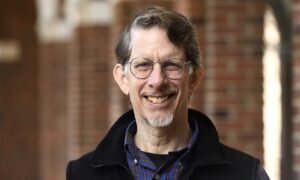Benjamin Hobbs, the Theodore M. and Kay W. Schad Professor of Environmental Management with the Department of Environmental Health and Engineering (EHE), did not always envision his life’s work becoming the use of analysis and economics to improve electric utility planning, operations, and policy.

Benjamin Hobbs
As an undergraduate student at South Dakota State University (SDSU) during the 1970’s, Hobbs, who is also a leadership council member for the Ralph O’Connor Sustainable Energy Institute (ROSEI), originally wanted to pursue a career that would have him on a boat every day studying algae and figuring out why lakes in the Midwest are so polluted. That all changed when he heard a presentation by a speaker who was an electric utility VP for environmental planning.
“He talked about how interesting a problem energy was. At the time, there were big discussions around energy in terms of do we want more coal and nuclear plants, how do we deal with water pollution killing fish, and public dislike of the transmission lines marring the landscape.” Hobbs said. “I came away thinking these were the same sort of problems I was interested in solving, so I spent the next summer walking up and down transmission lines, documenting how they affect aquatic habitat. I’ve been hooked ever since.”
Hobbs began to refine his research focus while pursuing his PhD at Cornell University when a mentor told him about a project involving deregulating electric utilities, which at the time was an unheard of idea. Within a decade, he became one of the leading researchers in the field.
Hobbs came to Johns Hopkins in 1995, when EHE wanted to expand its environmental focus to embrace energy. For roughly 15 years, he was the lone faculty member at the Whiting School of Engineering focused on studying electric power grids, while still cooperating with environmental scientists on ecosystem restoration research.
At the same time, Hobbs built an international reputation for his modeling of the performance of power markets. After the 2000-2001 California power crisis, this interest landed him on the Market Surveillance Committee for that state’s power market, helping to guide that market towards sustainable, reliable, and economic power supplies.
This focus put him at the forefront of many energy-related efforts at Hopkins, including serving as founding director of the former Environment and Energy Sustainable Health Institute (E2SHI). His time spent pursuing these sorts of efforts at Hopkins makes him as excited as anyone about ROSEI’s potential.
“Something like ROSEI is exactly what the university needed, so I couldn’t be more delighted about its creation,” Hobbs said. “We’ve been able to assemble a lot of new talent. The exciting thing is the initiatives we’ve already set up, and the different ways they pursue sustainable energy efforts.”
Though he is as passionate about this work now as he was when he first started out, Hobbs did consider switching research interests at different points in his career. But, he found the constantly changing landscape of the energy field so compelling that it has become his life’s work.
“Things are moving so fast and always change, you never get bored,” Hobbs said. “There is always something new to work on, new technology to work with and the problems have kept getting more important. That is what has kept me working in this area, and I love that I have.”
This year, the Institute for Operations Research and Management Science recognized that work by awarding Hobbs with the Harold Hotelling Medal for Lifetime Achievement in Energy, Natural Resources, and Environment for his research and for the many dozens of graduate students he has mentored into careers in the energy field.
